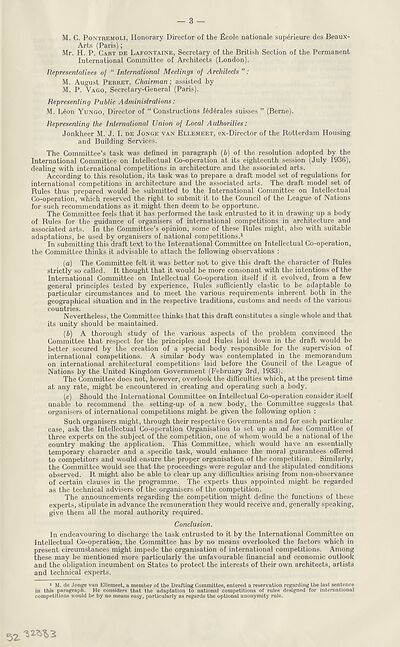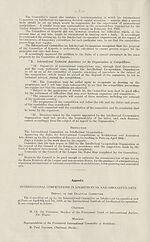Download files
Complete book:
Individual page:
Thumbnail gallery: Grid view | List view

— 3 —
M. G. Pontremoli, Honorary Director of the ficole Rationale superieure des Beaux-
Arts (Paris);
Mr. H. P. Cart de Lafontaine, Secretary of the British Section of the Permanent
International Committee of Architects (London).
Representatives of “ International Meetings of Architects
M. August Perret, Chairman; assisted by
M. P. Vago, Secretary-General (Paris).
Representing Public Administrations:
M. Leon Yungo, Director of “ Constructions federales suisses ” (Berne).
Representing the International Union of Local Authorities:
Jonkheer M. J. I. de Jonge van Ellemeet, ex-Director of the Rotterdam Housing
and Building Services.
The Committee’s task was defined in paragraph (b) of the resolution adopted by the
International Committee on Intellectual Co-operation at its eighteenth session (July 1936),
dealing with international competitions in architecture and the associated arts.
According to this resolution, its task was to prepare a draft model set of regulations for
international competitions in architecture and the associated arts. The draft model set of
Rules thus prepared would be submitted to the International Committee on Intellectual
Co-operation, which reserved the right to submit it to the Council of the League of Nations
for such recommendations as it might then deem to be opportune.
The Committee feels that it has performed the task entrusted to it in drawing up a body
of Rules for the guidance of organisers of international competitions in architecture and
associated arts. In the Committee’s opinion, some of these Rules might, also with suitable
adaptations, be used by organisers of national competitions.1
In submitting this draft text to the International Committee on Intellectual Co-operation,
the Committee thinks it advisable to attach the following observations :
(a) The Committee felt it was better not to give this draft the character of Rules
strictly so called. It thought that it would be more consonant with the intentions of the
International Committee on Intellectual Co-operation itself if it evolved, from a few
general principles tested by experience, Rules sufficiently elastic to be adaptable to
particular circumstances and to meet the various requirements inherent both in the
geographical situation and in the respective traditions, customs and needs of the various
countries.
Nevertheless, the Committee thinks that this draft constitutes a single whole and that
its unity should be maintained.
(b) A thorough study of the various aspects of the problem convinced the
Committee that respect for the principles and Rules laid down in the draft would be
better secured by the creation of a special body responsible for the supervision of
international competitions. A similar body was contemplated in the memorandum
on international architectural competitions laid before the Council of the League of
Nations by the United Kingdom Government (February 3rd, 1933).
The Committee does not, however, overlook the difficulties which, at the present time
at any rate, might be encountered in creating and operating such a body.
(c) Should the International Committee on Intellectual Co-operation consider itself
unable to recommend the setting-up of a new body, the Committee suggests that
organisers of international competitions might be given the following option :
Such organisers might, through their respective Governments and for each particular
case, ask the Intellectual Co-operation Organisation to set up an ad hoc Committee of
three experts on the subject of the competition, one of whom would be a national of the
country making the application. This Committee, which would have an essentially
temporary character and a specific task, would enhance the moral guarantees offered
to competitors and would ensure the proper organisation of the competition. Similarly,
the Committee would see that the proceedings were regular and the stipulated conditions
observed. It might also be able to clear up any difficulties arising from non-observance
of certain clauses in the programme. The experts thus appointed might be regarded
as the technical advisers of the organisers of the competition.
The announcements regarding the competition might define the functions of these
experts, stipulate in advance the remuneration they would receive and, generally speaking,
give them all the moral authority required.
Conclusion.
In endeavouring to discharge the task entrusted to it by the International Committee on
Intellectual Co-operation, the Committee has by no means overlooked the factors which in
present circumstances might impede the organisation of international competitions. Among
these may be mentioned more particularly the unfavourable financial and economic outlook
and the obligation incumbent on States to protect the interests of their own architects, artists
and technical experts.
1 M. de Jonge van Ellemeet, a member of the Drafting Committee, entered a reservation regarding the last sentence
in this paragraph. He considers that the adaptation to national competitions of rules designed for international
competitions would be by no means easy, particularly as regards the optional anonymity rule.
52
M. G. Pontremoli, Honorary Director of the ficole Rationale superieure des Beaux-
Arts (Paris);
Mr. H. P. Cart de Lafontaine, Secretary of the British Section of the Permanent
International Committee of Architects (London).
Representatives of “ International Meetings of Architects
M. August Perret, Chairman; assisted by
M. P. Vago, Secretary-General (Paris).
Representing Public Administrations:
M. Leon Yungo, Director of “ Constructions federales suisses ” (Berne).
Representing the International Union of Local Authorities:
Jonkheer M. J. I. de Jonge van Ellemeet, ex-Director of the Rotterdam Housing
and Building Services.
The Committee’s task was defined in paragraph (b) of the resolution adopted by the
International Committee on Intellectual Co-operation at its eighteenth session (July 1936),
dealing with international competitions in architecture and the associated arts.
According to this resolution, its task was to prepare a draft model set of regulations for
international competitions in architecture and the associated arts. The draft model set of
Rules thus prepared would be submitted to the International Committee on Intellectual
Co-operation, which reserved the right to submit it to the Council of the League of Nations
for such recommendations as it might then deem to be opportune.
The Committee feels that it has performed the task entrusted to it in drawing up a body
of Rules for the guidance of organisers of international competitions in architecture and
associated arts. In the Committee’s opinion, some of these Rules might, also with suitable
adaptations, be used by organisers of national competitions.1
In submitting this draft text to the International Committee on Intellectual Co-operation,
the Committee thinks it advisable to attach the following observations :
(a) The Committee felt it was better not to give this draft the character of Rules
strictly so called. It thought that it would be more consonant with the intentions of the
International Committee on Intellectual Co-operation itself if it evolved, from a few
general principles tested by experience, Rules sufficiently elastic to be adaptable to
particular circumstances and to meet the various requirements inherent both in the
geographical situation and in the respective traditions, customs and needs of the various
countries.
Nevertheless, the Committee thinks that this draft constitutes a single whole and that
its unity should be maintained.
(b) A thorough study of the various aspects of the problem convinced the
Committee that respect for the principles and Rules laid down in the draft would be
better secured by the creation of a special body responsible for the supervision of
international competitions. A similar body was contemplated in the memorandum
on international architectural competitions laid before the Council of the League of
Nations by the United Kingdom Government (February 3rd, 1933).
The Committee does not, however, overlook the difficulties which, at the present time
at any rate, might be encountered in creating and operating such a body.
(c) Should the International Committee on Intellectual Co-operation consider itself
unable to recommend the setting-up of a new body, the Committee suggests that
organisers of international competitions might be given the following option :
Such organisers might, through their respective Governments and for each particular
case, ask the Intellectual Co-operation Organisation to set up an ad hoc Committee of
three experts on the subject of the competition, one of whom would be a national of the
country making the application. This Committee, which would have an essentially
temporary character and a specific task, would enhance the moral guarantees offered
to competitors and would ensure the proper organisation of the competition. Similarly,
the Committee would see that the proceedings were regular and the stipulated conditions
observed. It might also be able to clear up any difficulties arising from non-observance
of certain clauses in the programme. The experts thus appointed might be regarded
as the technical advisers of the organisers of the competition.
The announcements regarding the competition might define the functions of these
experts, stipulate in advance the remuneration they would receive and, generally speaking,
give them all the moral authority required.
Conclusion.
In endeavouring to discharge the task entrusted to it by the International Committee on
Intellectual Co-operation, the Committee has by no means overlooked the factors which in
present circumstances might impede the organisation of international competitions. Among
these may be mentioned more particularly the unfavourable financial and economic outlook
and the obligation incumbent on States to protect the interests of their own architects, artists
and technical experts.
1 M. de Jonge van Ellemeet, a member of the Drafting Committee, entered a reservation regarding the last sentence
in this paragraph. He considers that the adaptation to national competitions of rules designed for international
competitions would be by no means easy, particularly as regards the optional anonymity rule.
52
Set display mode to:
![]() Universal Viewer |
Universal Viewer | ![]() Mirador |
Large image | Transcription
Mirador |
Large image | Transcription
Images and transcriptions on this page, including medium image downloads, may be used under the Creative Commons Attribution 4.0 International Licence unless otherwise stated. ![]()
| League of Nations > International > International competitions in architecture and associated arts > (3) |
|---|
| Permanent URL | https://digital.nls.uk/195218514 |
|---|
| Shelfmark | LN.XII |
|---|
| Description | Over 1,200 documents from the non-political organs of the League of Nations that dealt with health, disarmament, economic and financial matters for the duration of the League (1919-1945). Also online are statistical bulletins, essential facts, and an overview of the League by the first Secretary General, Sir Eric Drummond. These items are part of the Official Publications collection at the National Library of Scotland. |
|---|---|
| Additional NLS resources: |
|

